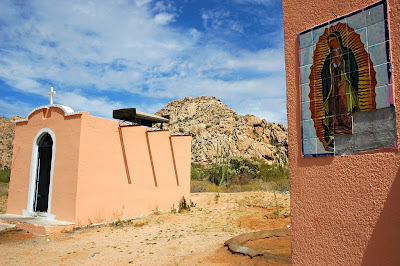
Tuesday of this week was the twenty-fifth anniversary of the death of
Father Walter Ciszek, an American Jesuit who spent much of his religious and priestly life engaged in clandestine ministry in the Soviet Union. Arrested by the NKVD in 1941 and charged as a "Vatican spy," Father Ciszek spent five years in Lubianka and a decade in the Siberian gulags before being released from hard labor in 1955 on the understanding that he would desist from further pastoral activity. Naturally, Father Ciszek refused to obey this order and continued to minister to underground 'parishes' in the Siberian cities of Norilsk, Krasnoyarsk and Abakan while working as an auto mechanic. He also sent letters to his two sisters in the United States, who, like his brother Jesuits, had long believed that he was dead.
Father Ciszek finally returned home to the United States in October of 1963, when he won his freedom in a Cold War prisoner exchange. Back in the United States, Father Ciszek wrote two books about his experiences in the Soviet Union -
With God in Russia and
He Leadeth Me - and spent the last two decades of his life giving retreats and serving as a spiritual director. Among other things, he also played an instrumental role in the establishment of
Holy Annunciation Monastery, a community of Discalced Carmelite nuns following the Byzantine liturgical and spiritual tradition. You can read more about Holy Annunciation Monastery in
this article, which also offers some unique insights into Father Ciszek's later life and personality. Grateful for Father Ciszek's spiritual guidance, the nuns of Holy Annunciation Monastery have played an important role in
promoting Ciszek's cause for canonization, a task formally entrusted since 1989 to the
Father Walter Ciszek Prayer League.
Though I never met him, Walter Ciszek has played a noteworthy role in my life. I first heard his name at Georgetown, where Father Tom King suggested that I read
With God in Russia as part of my discernment of a possible vocation to the Jesuits. I followed Father King's advice and found myself sufficiently moved by
With God in Russia that I decided to read
He Leadeth Me as well. While my personal experiences with Jesuits played a much larger role in my decision to enter the Society than any books that I read, I found a lot of inspiration in the story of Walter Ciszek, a self-described "tough Pole" from a Pennsylvania mining town who managed to combine an exemplary gentleness and humility with the strength and guile needed to survive years of imprisonment and exile behind the Iron Curtain.
Looking back, I realize that reading Ciszek's account of his life deepened my desire to enter the Society in which he spent his life. Having had the opportunity to read each of Ciszek's books a second time since I entered the Jesuits, I found that I appreciate his reminiscences in an even more vivid way now that I relate them a bit more to my own lived experience. Beyond that, I am proud to have lived for three years in
a Jesuit residence named for Father Ciszek and to have gotten to know Jesuits who knew Ciszek personally. Of course, I couldn't have anticipated any of this when I first read
With God in Russia on Tom King's recommendation. Then again, as Walter Ciszek's story so eloquently teaches us, God's plans for us are often greater than any that we could have imagined for ourselves. AMDG.






















